[ad_1]
Every powerful, resilient, and statuesque upper frame is built on back workouts. While six-pack abs, chests and biceps may hog the spotlight, your back muscles are one of the most important muscle groups in the support structure for your entire body.
Incorporating thorough back exercises into your regimen will help stabilize your spine and neck, improve posture and muscular balance, reinforce your body against injury, and boost core strength and everyday functional fitness.
Related: 50 Best Arm Exercises of All Time
Here are the 30 best back workouts that focus on building key muscles, including deltoids, lats, and obliques.
30 Best Back Exercises
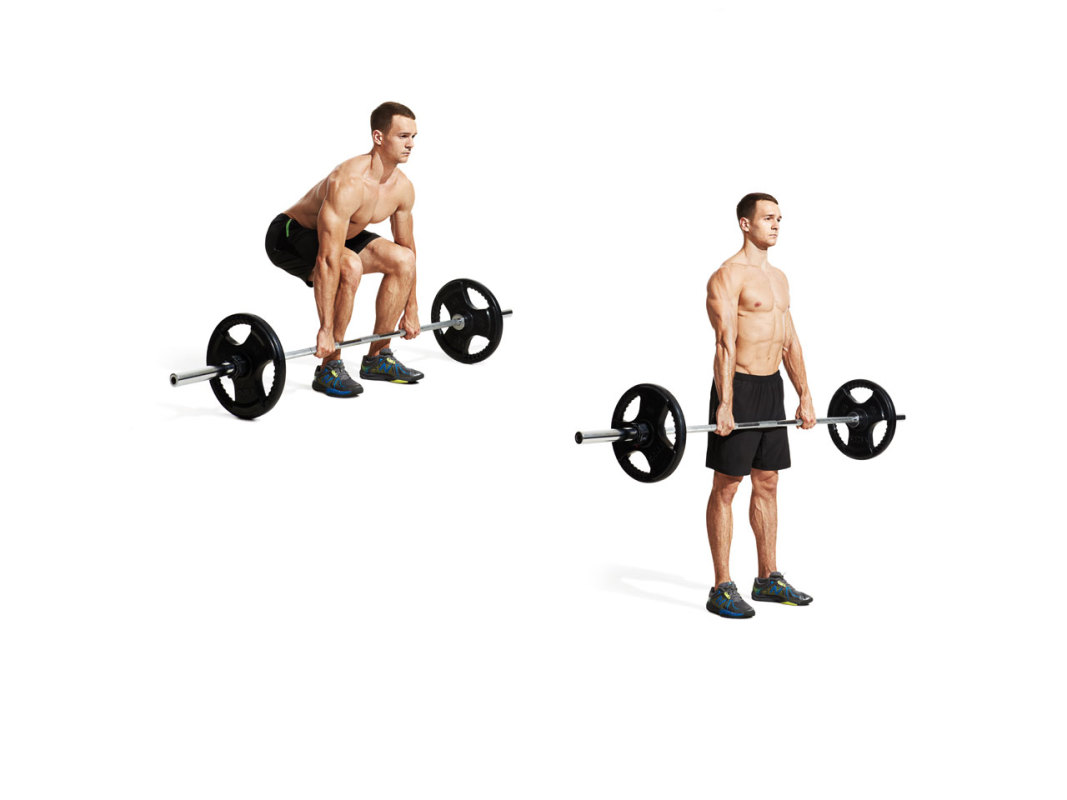
How to do it:
- Stand with feet hip-width apart and bend your hips back.
- Your grip should be just outside of your knees.
- Keeping a flat black, extend your hips to stand up, and pull the bar up along your body until lock-out, as your hips drive through and your shoulders move back.
- While pulling, keep your eyes on the ground a few feet in front of you.
- Carefully lower the bar back to the starting position.
Pro tip:
Contract your glutes as you return to starting position. This should keep the strain off of your lower back.
Variation:
This move can be done using a kettlebell. There’s also a dumbbell single-leg variation of this move, where you hold a dumbbell in each hand at your sides and lean forward while lifting one leg straight behind you. As your chest comes forward, the dumbbells should shift from your sides to directly over your planted foot.
Return to starting position by lowering your back leg as you come up and returning the dumbbells to your sides.
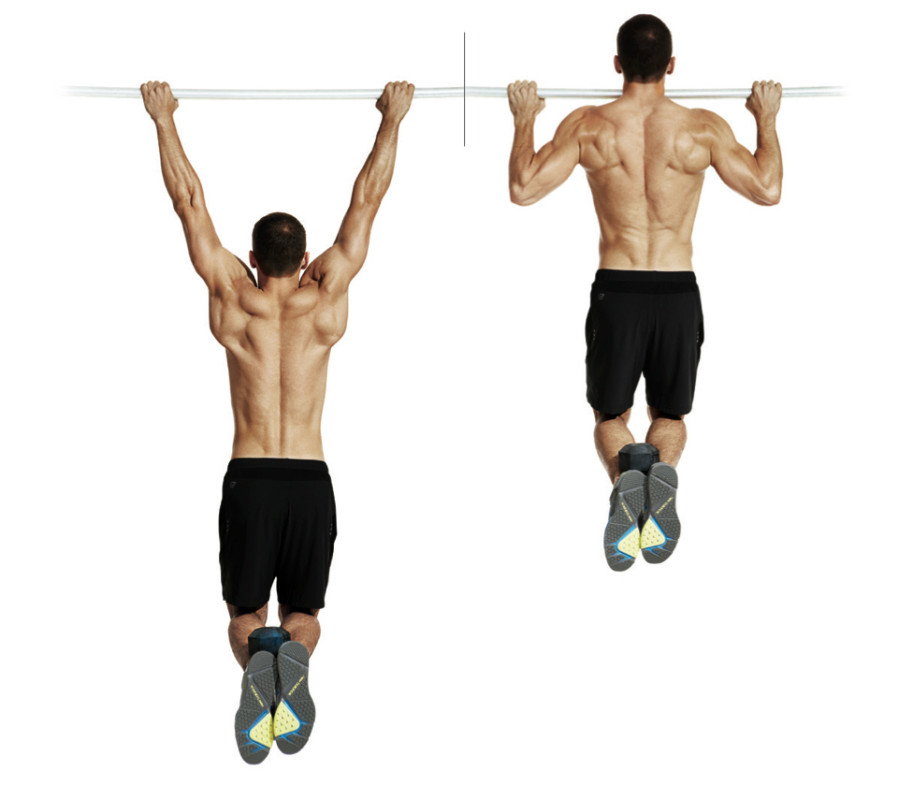
How to do it:
- Attach a weighted belt to your waist or hold a dumbbell between your feet.
- Pull yourself up until your chin is over the bar.
- Lower yourself back down to complete one rep.
Related: Best Home Pullup Bars
Pro tip:
Keep your hands just outside shoulder-width.
Variation:
If you struggle to complete your reps with weight, start with using body weight alone.
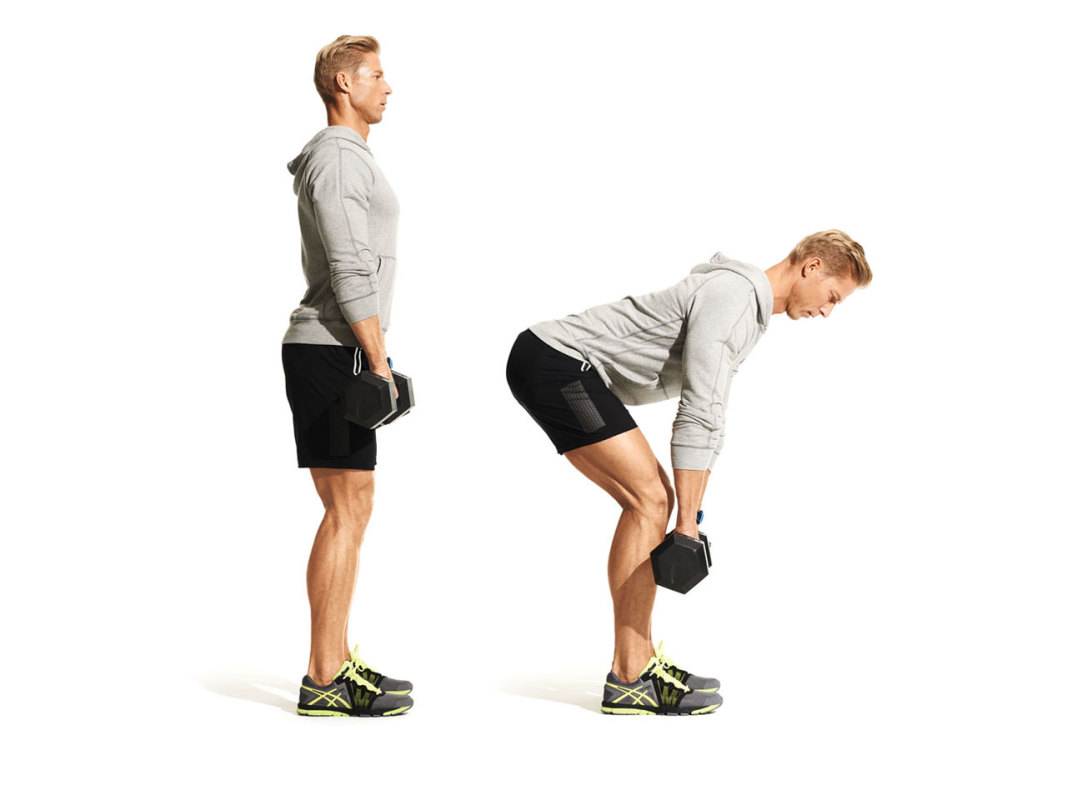
How to do it:
- Grasp two dumbbells and hold them with feet set hip-width apart.
- Keeping your lower back in its natural arch, bend hips back, your torso forward, and lower yourself until you feel a stretch in your hamstrings.
- You may bend at the knees. Squeeze your glutes at the top of the movement after coming back up.
Pro tip:
Contract your glutes as you return to starting position. This should keep the strain off of your lower back.
Variation:
This move is a variation of the traditional deadlift, done with a barbell or kettlebell as well. There’s also a single-leg version, where you hold a dumbbell in each hand at your sides and lean forward while lifting one leg straight behind you. As your chest comes forward, the dumbbells should shift from your sides to directly over your planted foot.
Return to starting position by lowering your back leg as you come up and returning the dumbbells to your sides.
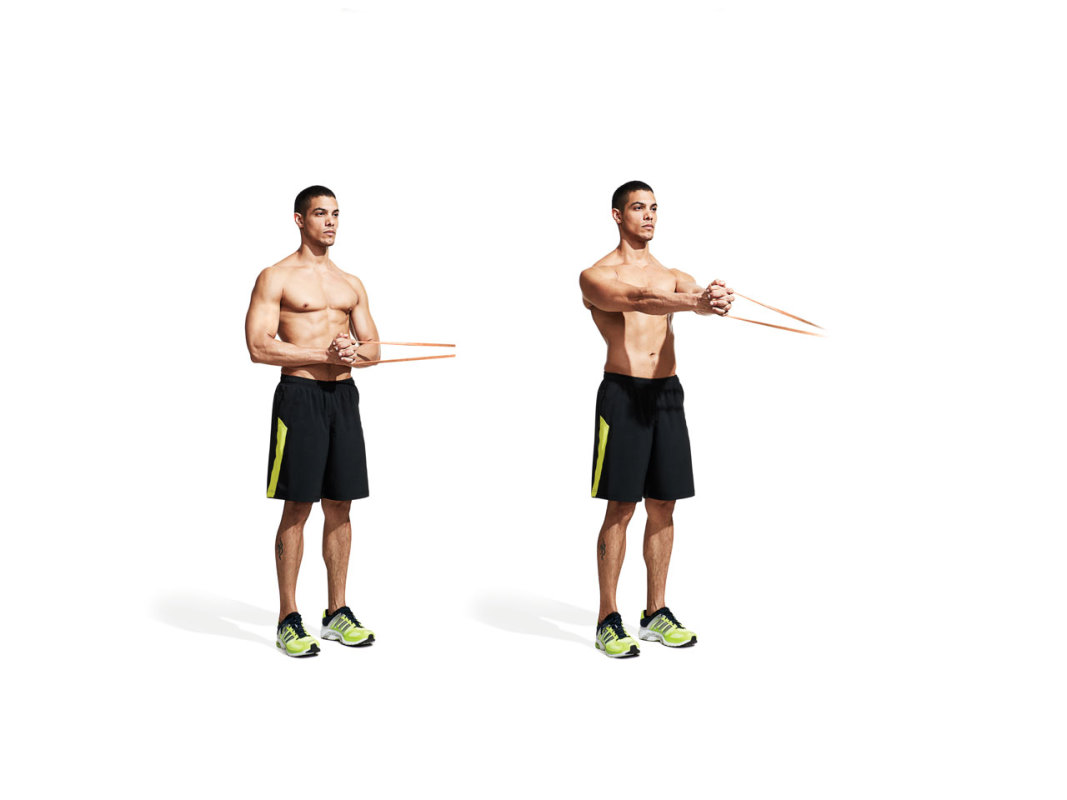
How to do it:
- Attach a single-grip handle to a cable pulley and set it at about shoulder height.
- Grasp the handle with one hand over the other and step away from the machine to put tension on the cable; turn to your left 90-degrees so your right side faces the machine.
- Stand with feet shoulder-width apart and extend your arms in front of you.
Pro tip:
The cable recoil will try to twist your body toward it—resist.
Variation:
This move can be done using a resistance band as well.
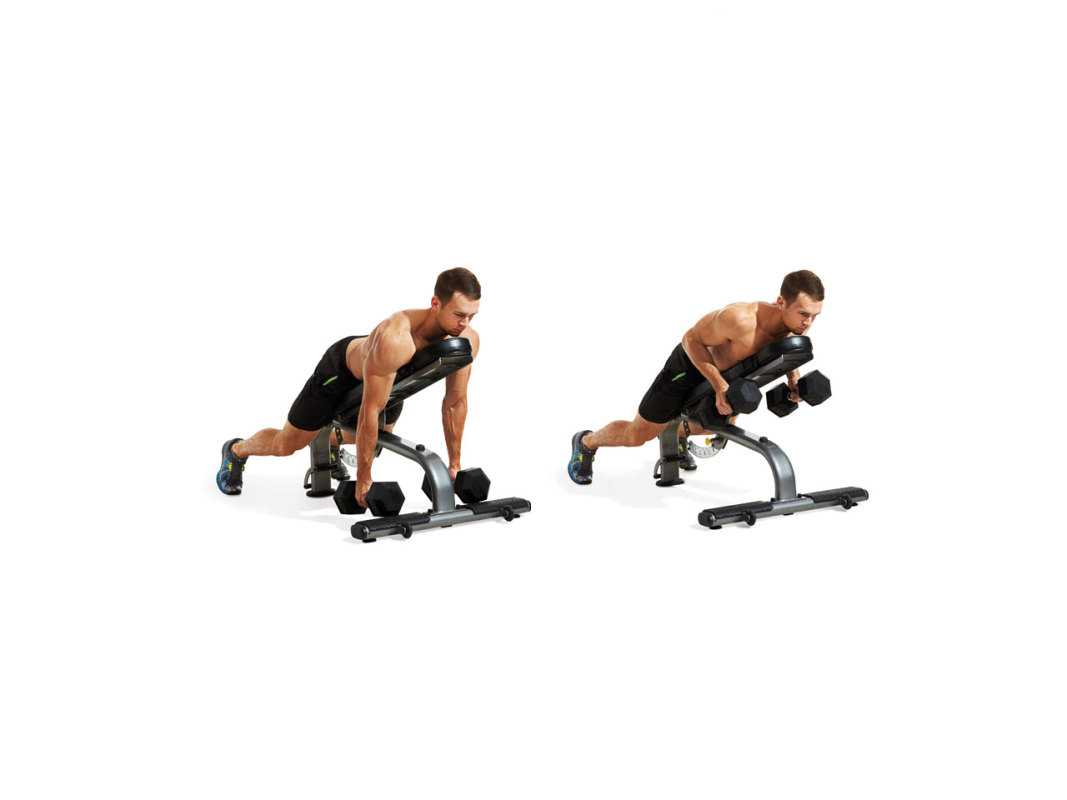
How to do it:
- Set an adjustable bench to a 30- to 45-degree incline and lie on it chest-down.
- Grasp a dumbbell in each hand and draw your shoulder blades back and together as you row the weights to your sides.
- Aim for 10-15 reps per set.
Pro tip:
Keep your neck neutral to avoid strain.
Variation:
This move can also be done isolating one arm at a time. Perform 2-3 sets on one side before alternating to the other.
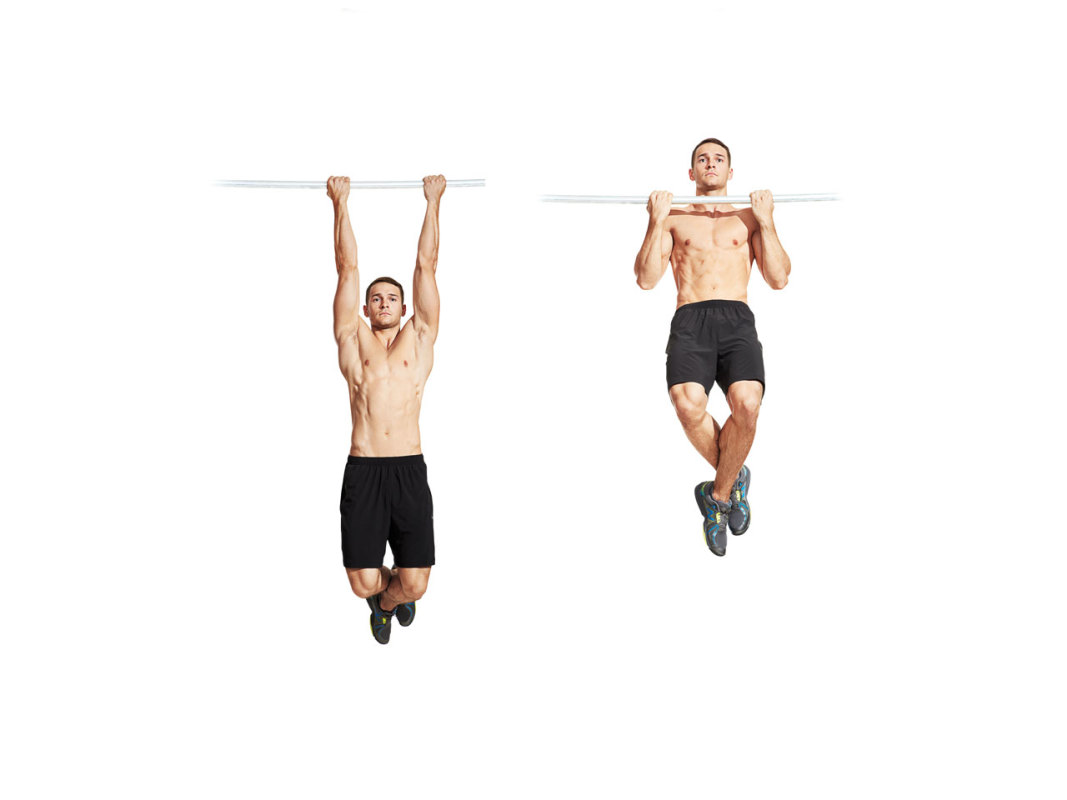
How to do it:
- Hang from a chin-up bar with hands shoulder-width apart using a supinated grip (so, palms facing you).
- From the bottom of the movement, pull yourself up until your chin is over the bar.
- Lower your chin below the bar to complete one rep.
Pro tip:
Avoid lowering yourself at the bottom of the rep so that your arms are fully extended. Keep your elbows slightly bent throughout.
Variation:
For prolonged muscle engagement, you can go to the top of the move and hold for at least 3-5 seconds before lowering your chin below the bar again.
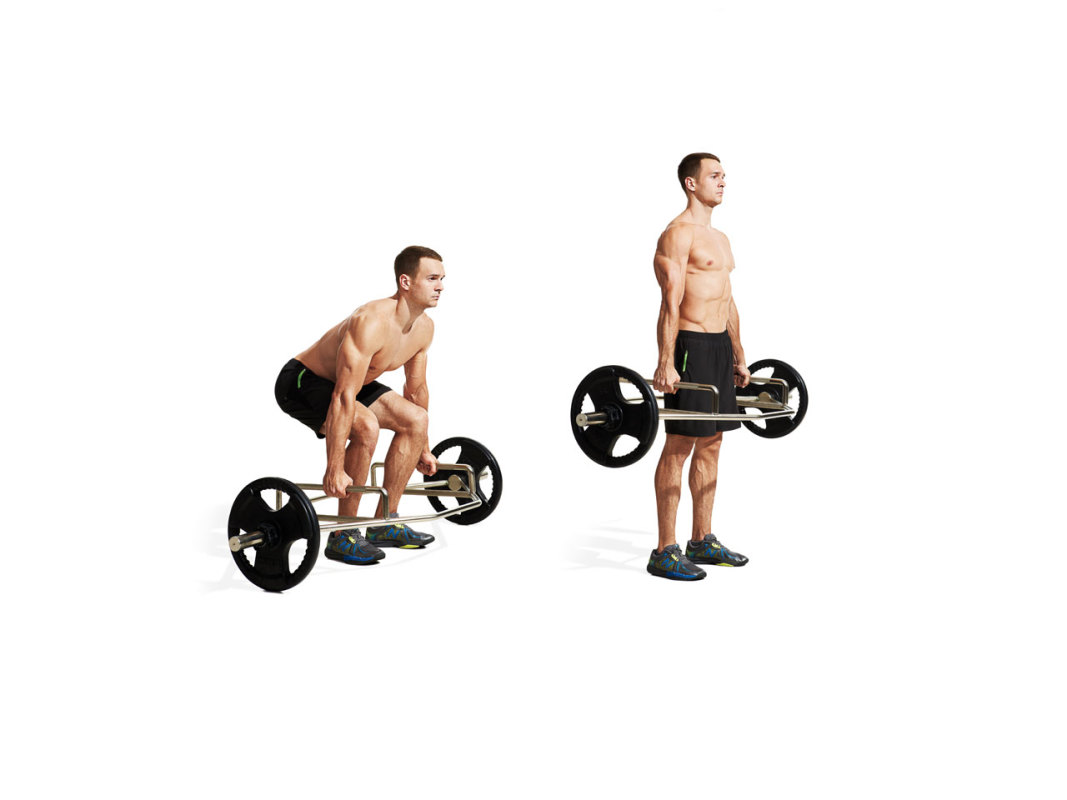
How to do it:
- Use a trap bar and stand with feet at hip-width apart.
- Bend your hips back and grasp the handles.
- Keeping your lower back in its natural arch, drive through your heels to stand up straight and extend your hips and knees.
- Bend your knees and waist as you lower the bar back to start.
Pro tip:
Squeeze your glutes at the top of the lift and keep your neck neutral throughout the move.
Variation:
There are numerous variations to the deadlift with different weight. This move can also be done using resistance bands.
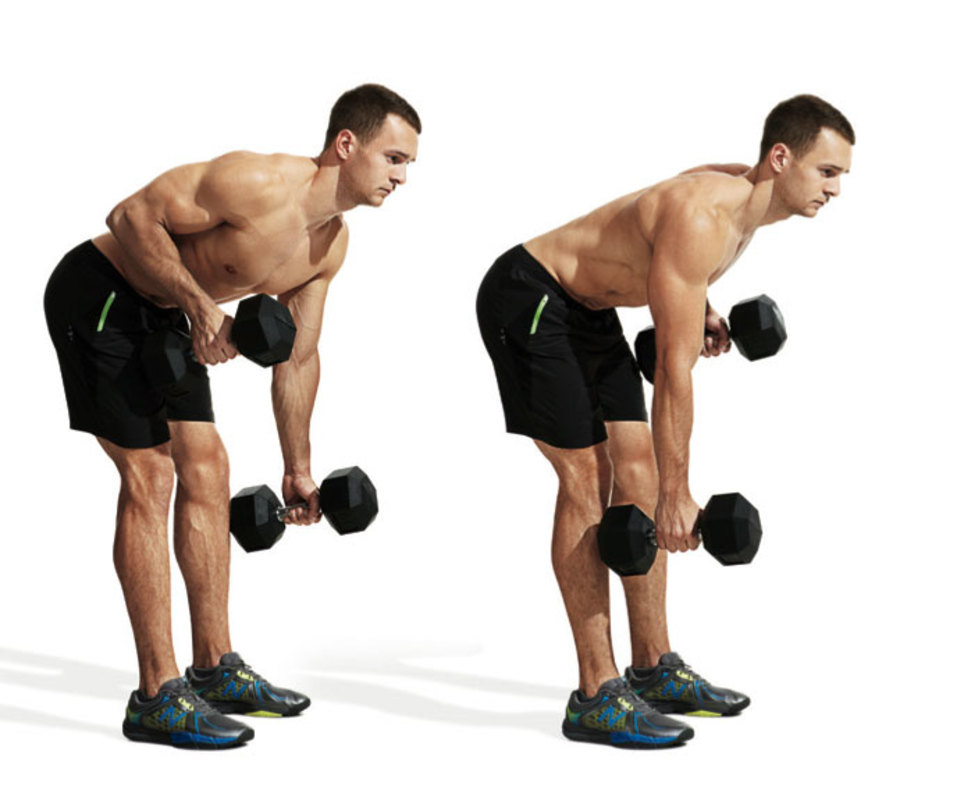
How to do it:
- Bend forward at the hips as you do in the Romanian deadlift, and row one dumbbell to your side.
- Lower it and repeat on the other side.
Pro tip:
Keep your neck aligned with your shoulders as you bend forward.
Variation:
This is considered a variation of the Romanian deadlift and the incline dumbbell row.
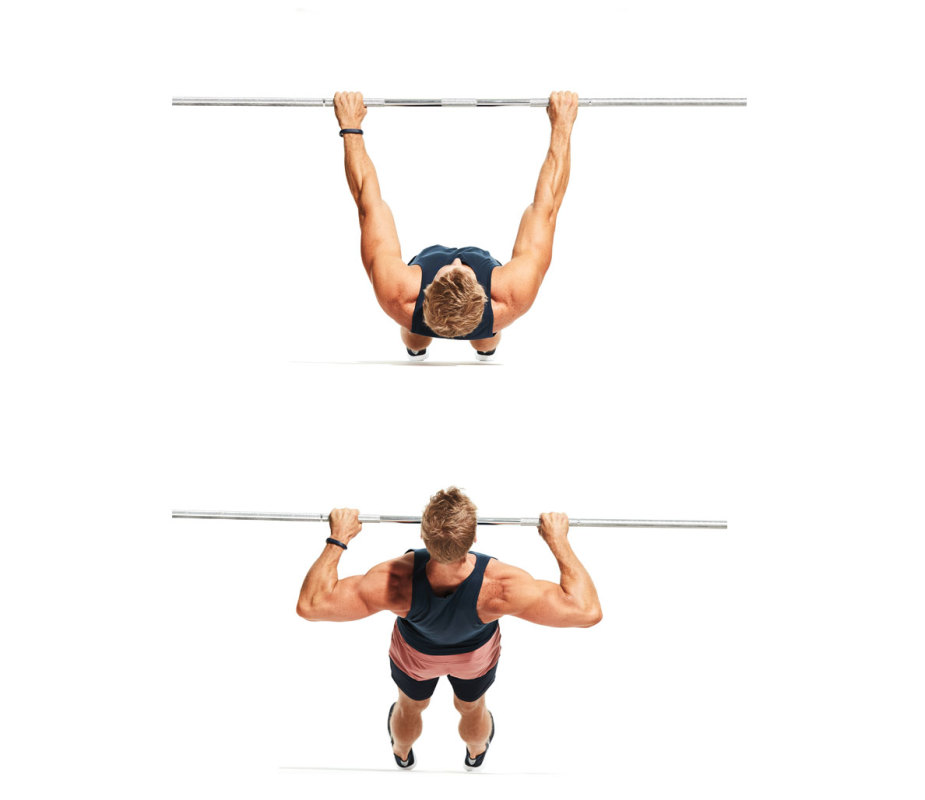
How to do it:
- Set a barbell in a power rack (or use a Smith machine) at about hip height.
- Lie underneath it and grab it with hands about shoulder-width apart with the bottom of your heels on floor.
- Hang from the bar so your body forms a straight line.
- Squeeze your shoulder blades together and pull yourself up until your back is fully contracted.
Pro tip:
Place the barbell at about four rungs up on a standard machine.
Variation:
This move works similarly to the push-up, so you can try those first, if you have any shoulder issues.
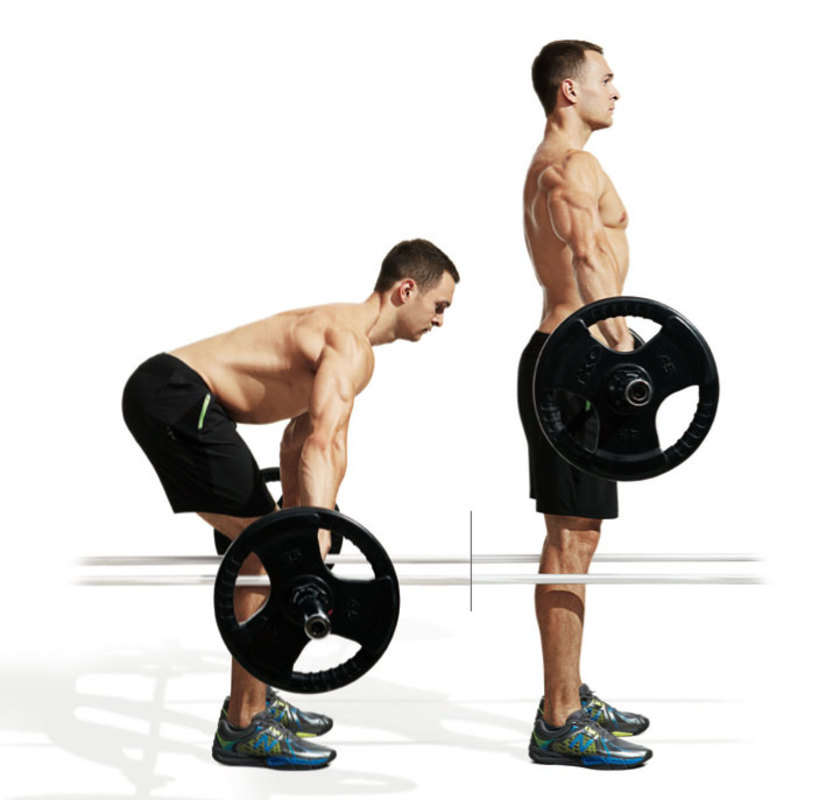
How to do it:
- Set up as you would to deadlift, only do so in a power rack, resting the bar on the safety rods.
- Grasp the bar wide, hands about double shoulder width.
- Extend your hips and stand up, pulling the bar to in front of your thighs.
Pro tip:
The resting bar should be at about two inches below your knees before you grab.
Variation:
You can start with dumbbells or a kettlebell before moving to a barbell.
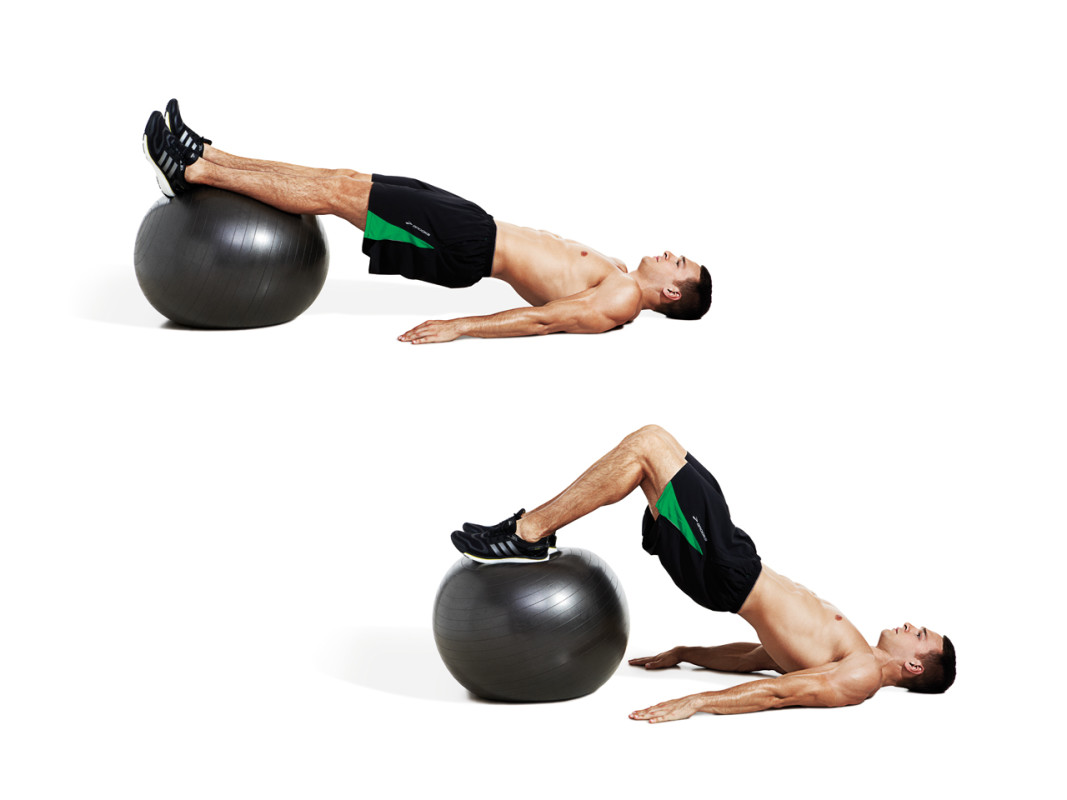
How to do it:
- Lie on the floor/mat on your back and rest your heels on a Swiss ball.
- Brace your abs, keeping your core in a plank position, and drive your heels into the ball to raise your hips off the floor.
- Bend your knees and roll the ball toward you.
- Keep your hips elevated the entire set.
Pro tip:
Keep your core engaged throughout this move so that your hips don’t dip. Also, be sure to perform this move on a surface that allows the stability ball to move easily but not slip.
Variation:
This move is pretty straightforward, though some may prefer to perform it without shoes to get better leverage.
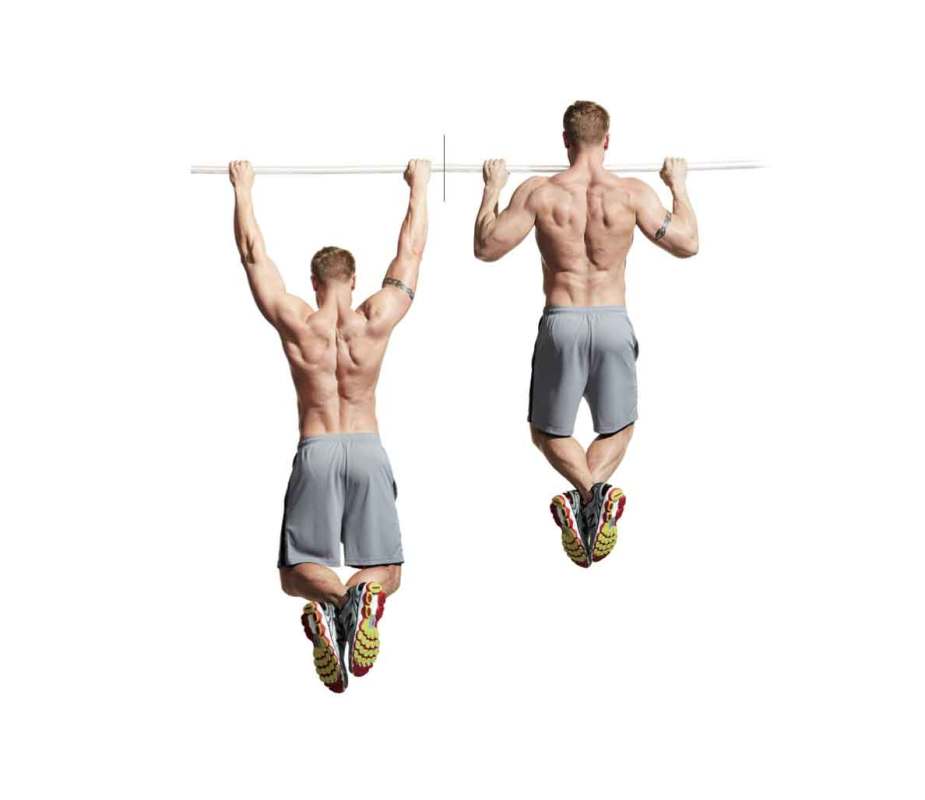
How to do it:
- Grab a pull-up bar with an overhand grip.
- Hang from the bar and then pull yourself up until your chin is over it.
- Lower your chin below the bar to complete one rep.
Pro tip:
Avoid lowering yourself at the bottom of the rep so that your arms are fully extended. Keep your elbows slightly bent throughout.
Variation:
For prolonged muscle engagement, you can go to the top of the move and hold for at least 3-5 seconds before lowering your chin below the bar again.
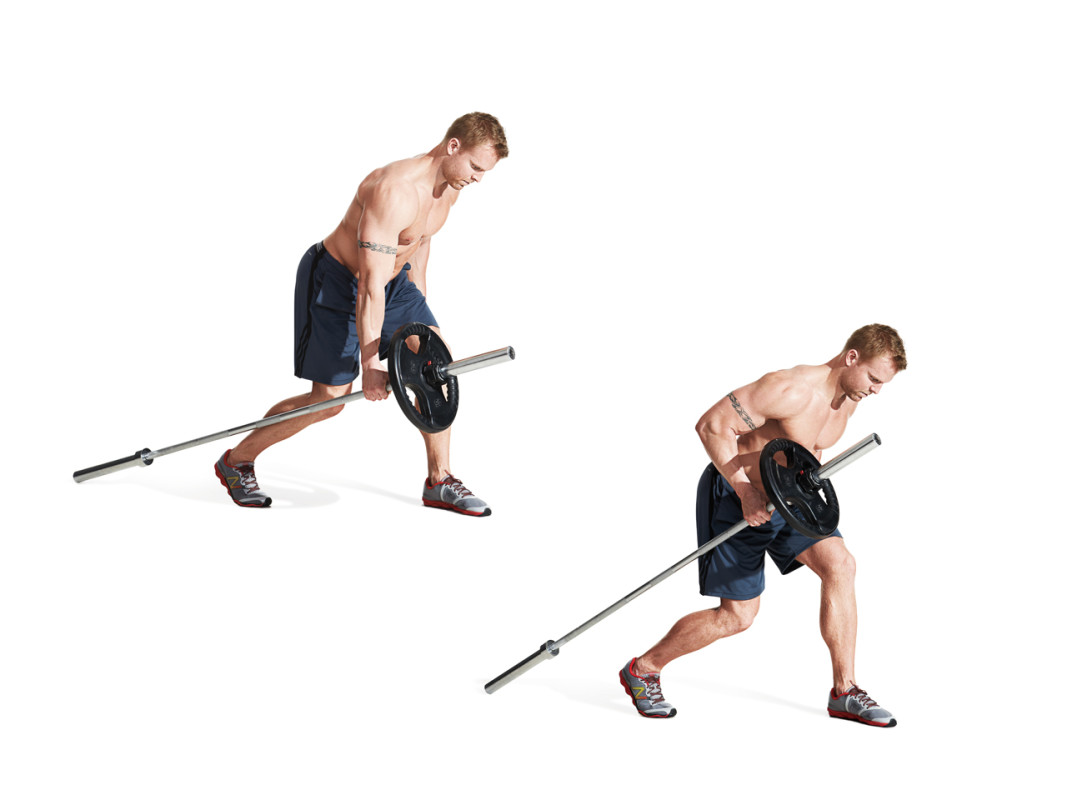
How to do it:
- Place the end of the bar into a corner.
- Facing away from the corner, hold the barbell at the opposite end, above where you load the weights, with your right hand.
- Stand so your left leg is forward.
- Keeping your lower back flat, bend at the hips until your torso is slightly above parallel with the floor.
- Draw your shoulder blade back and row the bar to your ribs.
Pro tip:
Wrap towels around the end of the bar, or put padding the corner, to avoid damaging the wall and floor.
Variation:
This move can be considered a variation of the alternating dumbbell row and the incline dumbbell row.
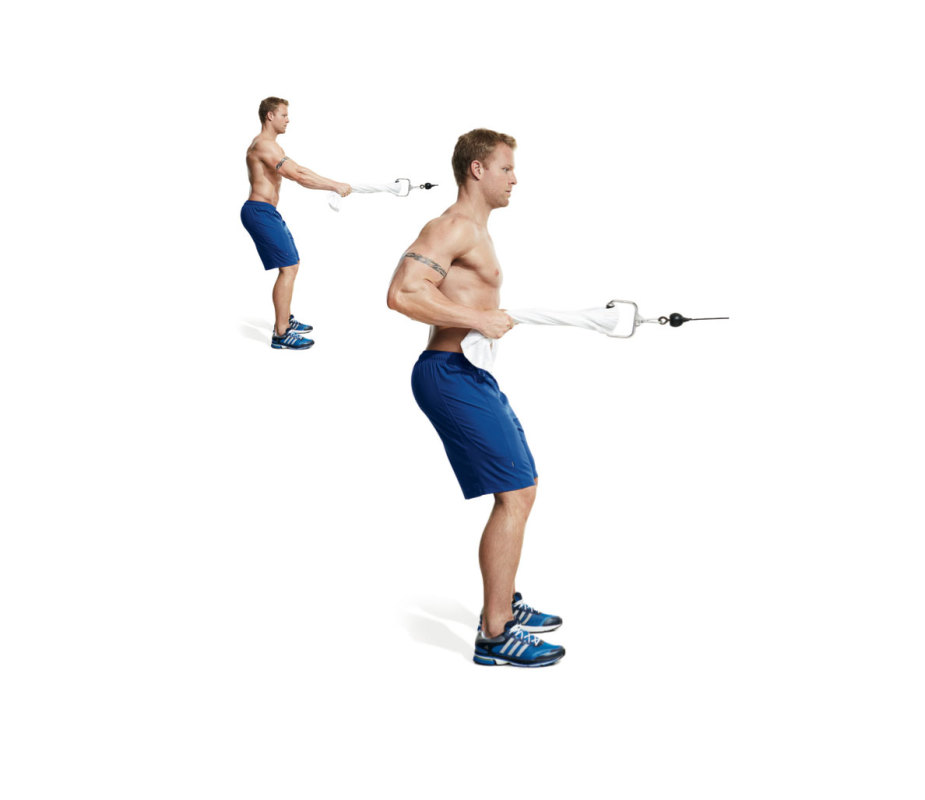
How to do it:
- Hook a towel to a cable pulley and stand in front of it.
- Set up to do a row, holding an end of the towel in each hand.
- Squeeze your shoulder blades together and row the towel to your rib cage.
Pro tip:
Keep your elbows tight to your sides when rowing.
Variation:
This move can be done with a resistance band and setting your stance with one foot in front of the other.
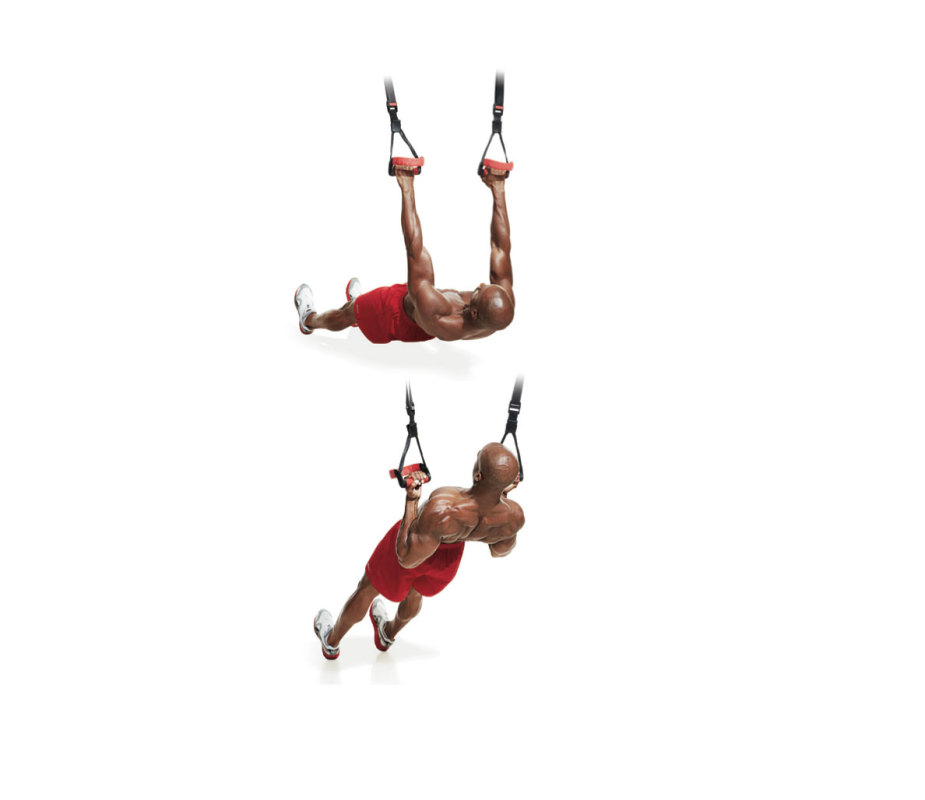
How to do it:
- Hold the handles of a suspension trainer and lean back with arms extended so that your body is supported by the suspension trainer and only your feet are on the floor.
- Brace your core and hold your body in a straight line. Start with your palms facing your feet, and as you row your body up, twist your wrists outward so that your palms face up in the top position.
Pro tip:
The lower you set the handles, the harder the exercise.
Variation:
You can elevate your feet to add difficulty to this move.
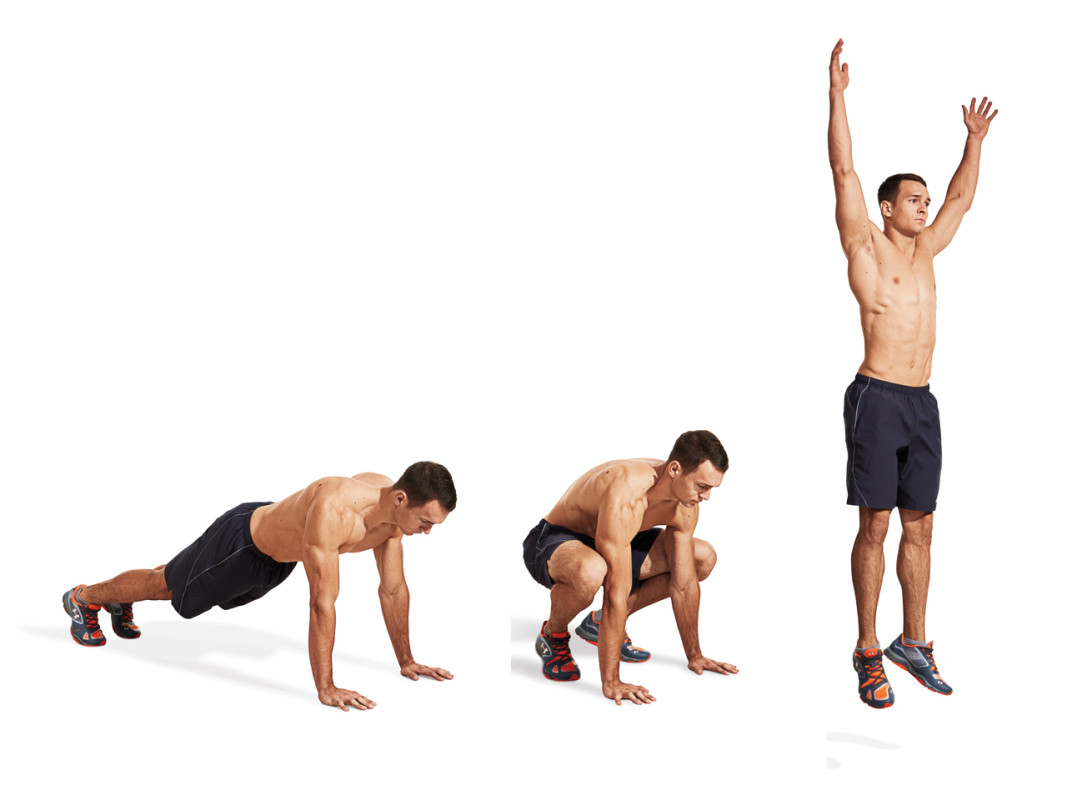
How to do it:
- Stand with feet outside shoulder-width apart.
- Bend down into a squat position and place your hands on the floor.
- Thrust your legs behind, you so you end up at the top of a pushup position.
- Bring your legs back up so they land outside your hands, and then jump up quickly. That’s one rep.
Pro tip:
Find a rhythm with breathing throughout your reps and focus on maintaining full range of motion each time. It’s paramount to completing a number of reps without overexertion.
Variation:
There aren’t many variations to the burpee outside of breaking the move out into mountain climbers or jump squats.
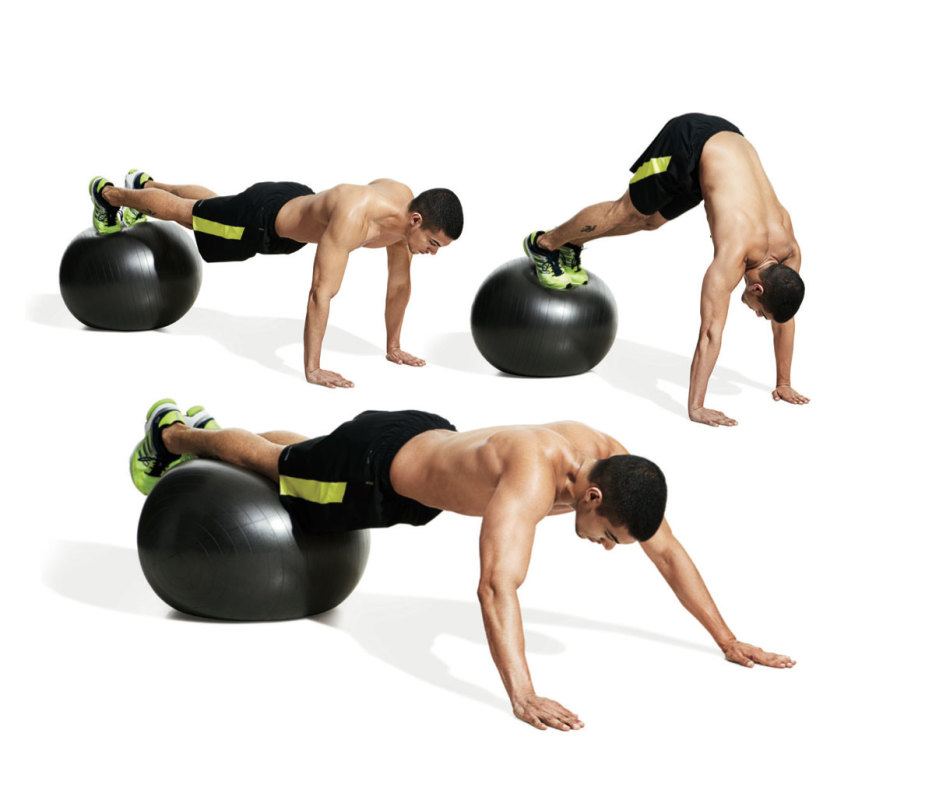
How to do it:
- Get into push-up position with your toes on an exercise ball.
- Bend your hips and roll the ball toward you so your torso becomes vertical.
- Roll back so your body is straight again and extend your spine.
- Roll the ball up your legs so your body forms a straight line with arms extended overhead but hands still on the floor.
- You should look like Superman flying downward. That’s one rep.
- Pull with your lats to return to the pushup position and begin the next rep.
Pro tip:
Keep your core engaged for the entire rep.
Variation:
If it’s too difficult to maneuver the exercise ball during this move, try doing it on an exercise mat first by walking your legs in and out of the pike position.
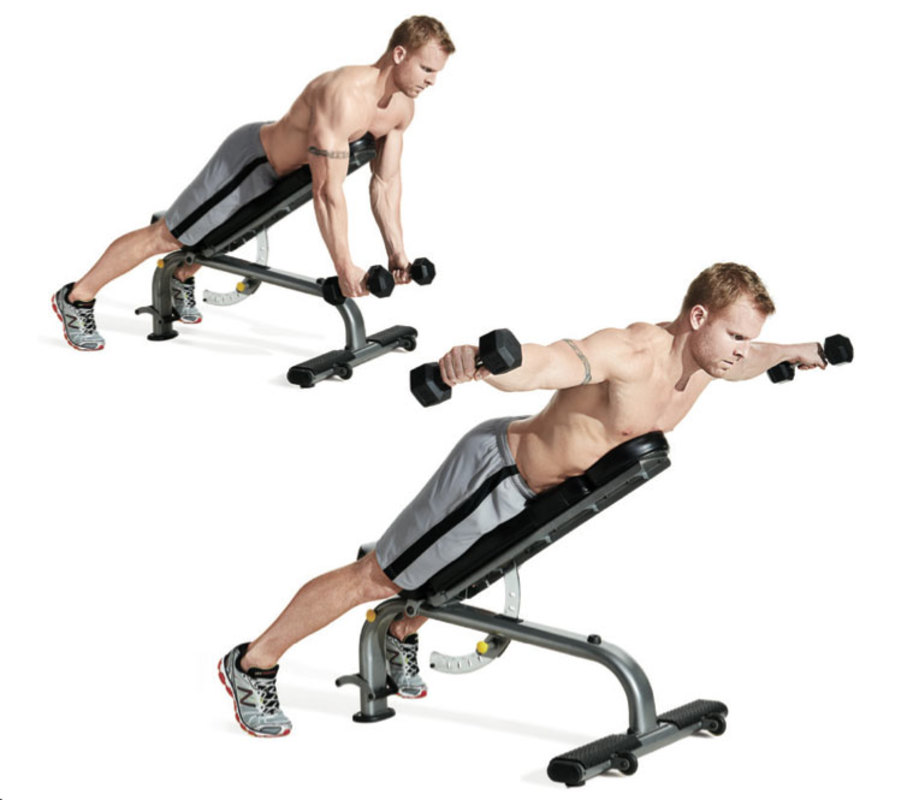
How to do it:
- Set an adjustable bench to a 30-degree incline and lie on it chest-down with a dumbbell in each hand.
- Squeeze your shoulder blades together and raise your arms out 90 degrees to your sides so your palms face down in the top position.
Pro tip:
Keep your neck neutral to avoid strain.
Variation:
This move can also be done isolating one arm at a time. Perform 2-3 sets on one side before alternating to the other.
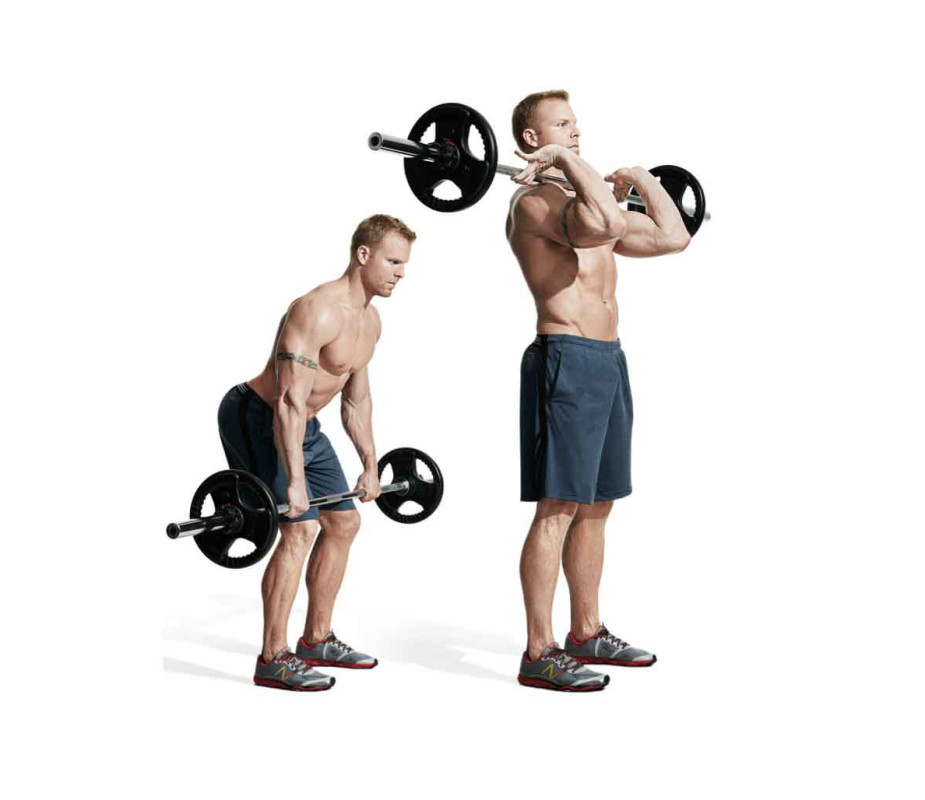
How to do it:
- Start by holding the bar against your body with your hands at shoulder-width on the bar.
- Keeping your back in its natural curve, bend your hips and knees (as you would in a squat), lowering the bar to just above your knees.
- Explosively extend your hips as if jumping, while at the same time shrugging your shoulders and pulling the bar straight up in front of your torso.
- As the bar reaches chest level, bend your elbows and flip your wrists to catch the bar at shoulder level.
Pro tip:
Bend your hips and knees as you catch the bar to absorb the impact.
Variation:
This move can also be done with dumbbells. Rest one on each shoulder and do a rep with elbows pointed up and triceps forward.
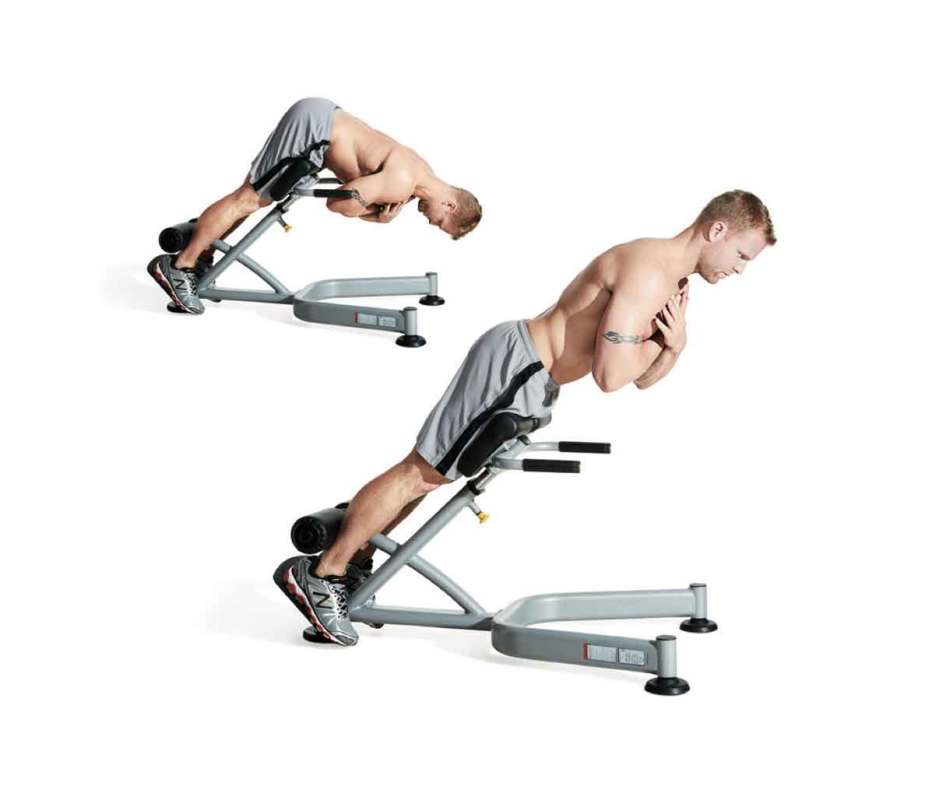
How to do it:
- Lock your legs into a back extension bench
- Bend your torso forward so that your hips are bent almost 90 degrees.
- Extend your hips so that your body forms a straight line.
Pro tip:
Engage your core when extending your hips back to starting position.
Variation:
This move works as an inverted sit-up. It can be done with additional weight if you choose.
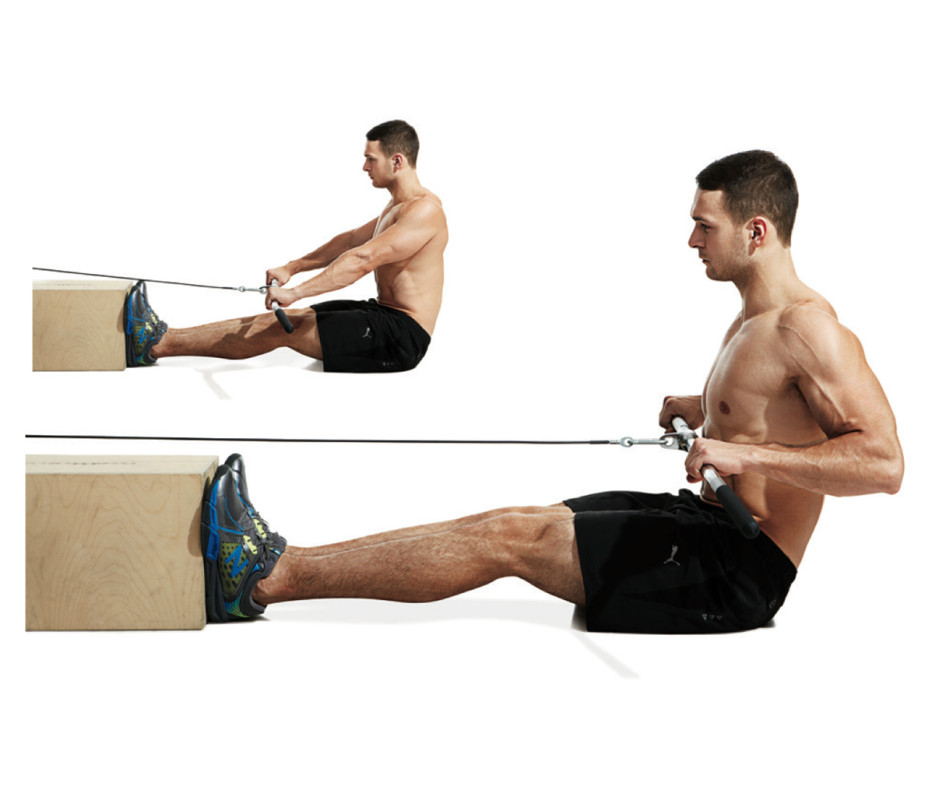
How to do it:
- Attach a straight or lat-pulldown bar to the pulley of a seated row station.
- Sit on the bench (or floor) with your feet against the foot plate and knees slightly bent.
- Keeping your lower back flat, bend forward at the hips to grasp the bar and row it to your sternum.
- Extend your arms and feel the stretch in your back before beginning the next rep.
Pro tip:
Squeeze your shoulder blades together at the end of the row position.
Variation:
This move can be done with resistance bands by wrapping one end around your toes and rowing the other end with both hands.
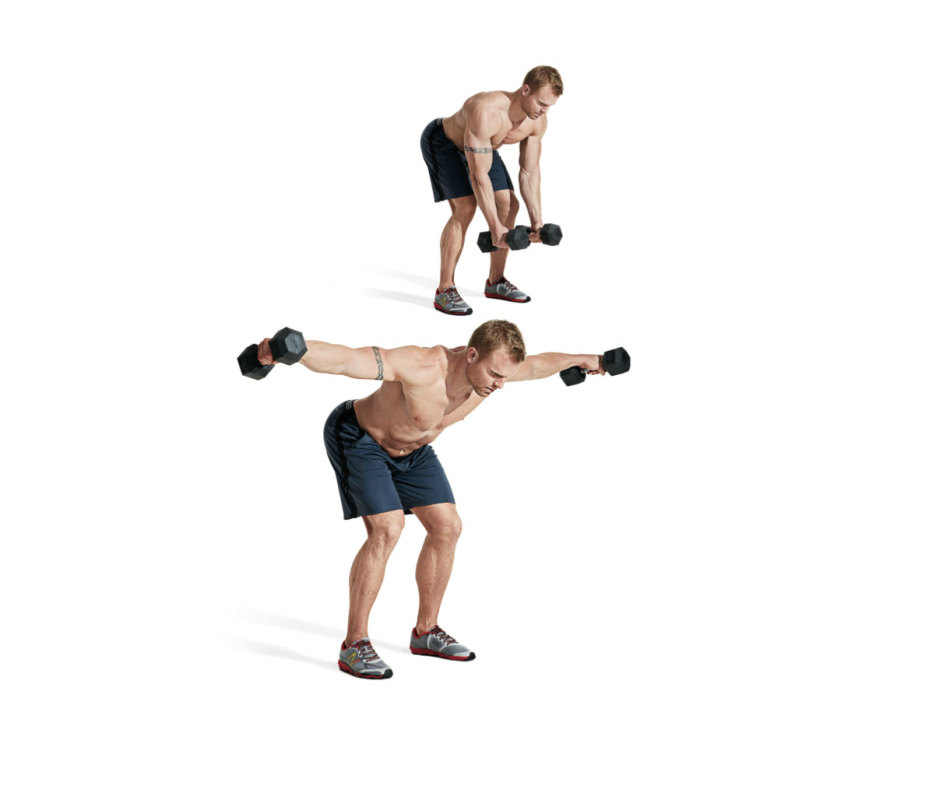
How to do it:
- Set up as you did for the neutral-grip row, but with lighter dumbbells.
- Raise your arms out to your sides 90 degrees, squeezing your shoulder blades together at the top for a second.
- Complete your set and then rest before beginning the next.
Pro tip:
Set a timer for three minutes and perform each set within that time frame.
Variation:
This can be a variation of the lying lateral raise, where you lie on a bench at an angle and perform the move.
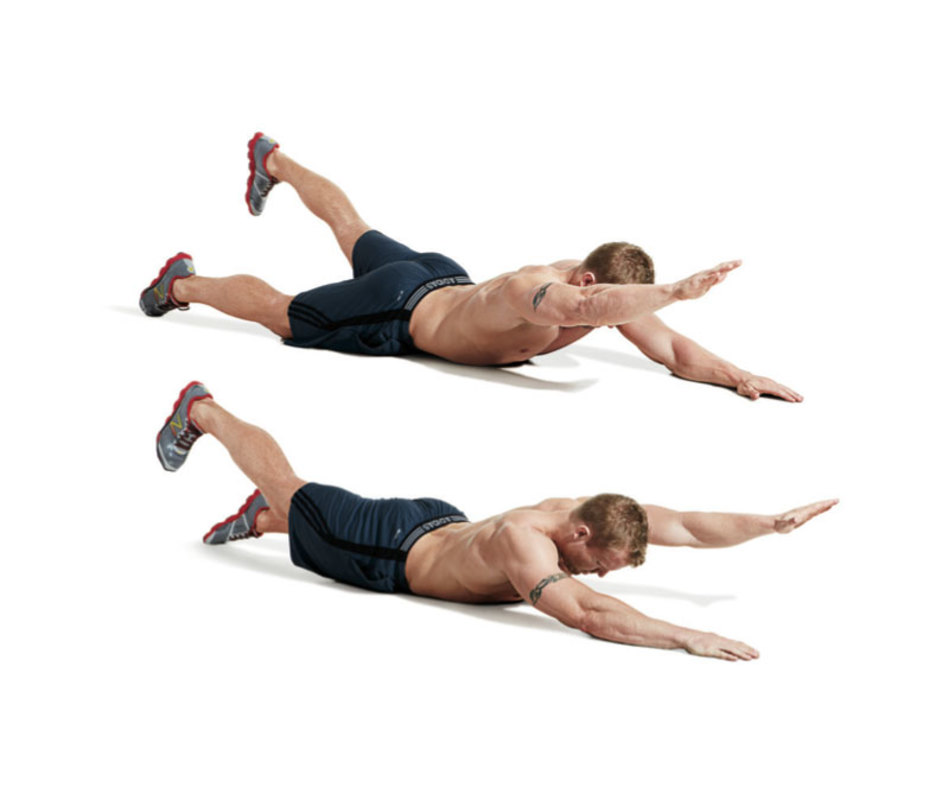
How to do it:
- Set up as you did for the back extension and then raise your left arm and right leg off the floor.
- Hold at the top for a second with both limbs straight and then lower back down.
- Repeat with your right arm and left leg. That’s one rep.
Pro tip:
Keep your neck neutral to avoid strain.
Variation:
There aren’t a lot of variations to this move outside of actually swimming.
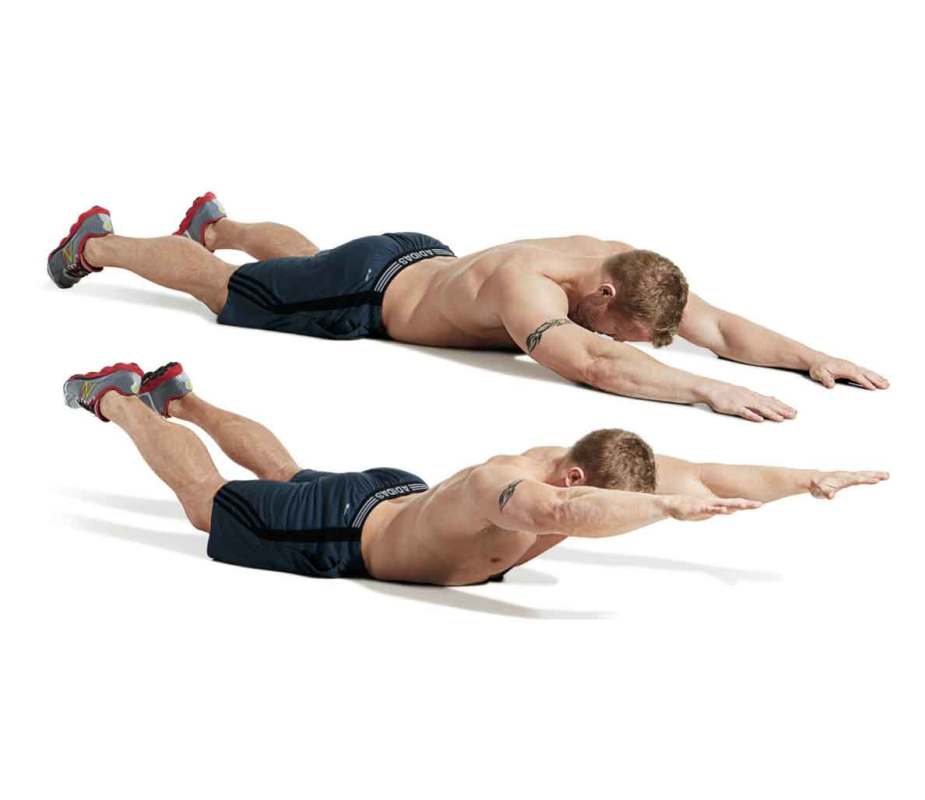
How to do it:
- Raise your hands and legs off the floor (and hold them straight) so that only your hips remain in contact with it.
- Contract your back as if you were trying to touch your heels and elbows to the ceiling and hold for 2-3 seconds.
- Lower your arms and legs back down to complete one rep.
Pro tip:
Keep your neck neutral to avoid strain.
Variation:
This move is pretty straight-forward. But you can start with the aquaman and work your way here.
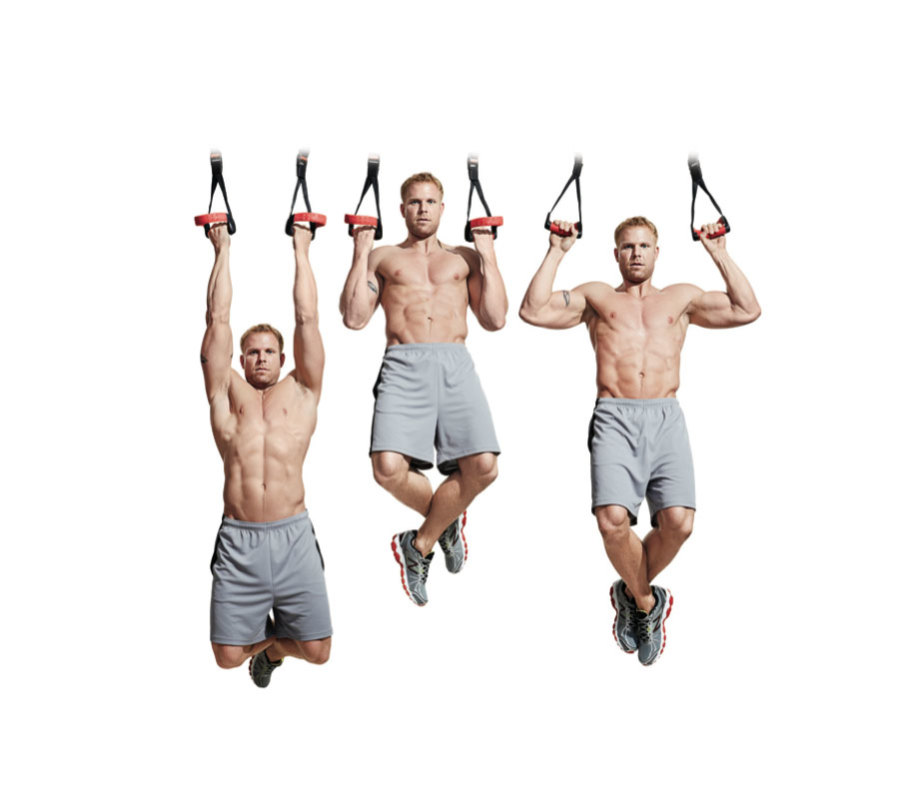
How to do it:
- Attach a suspension trainer to a sturdy object overhead.
- Set the handles less than shoulder-width apart and high enough so that when you hang from them your feet will be off the floor.
- Grasp the handles, with palms facing you, and hang.
- Pull yourself up until your chin is above your hands.
- Begin to lower yourself, moving your elbows away from your body and rotating your palms to face forward. That’s one rep.
Pro tip:
Lower yourself slowly. It should take three to five seconds to come back down.
Variation:
If you have wrist issues, you can start with traditional bar pull-ups.
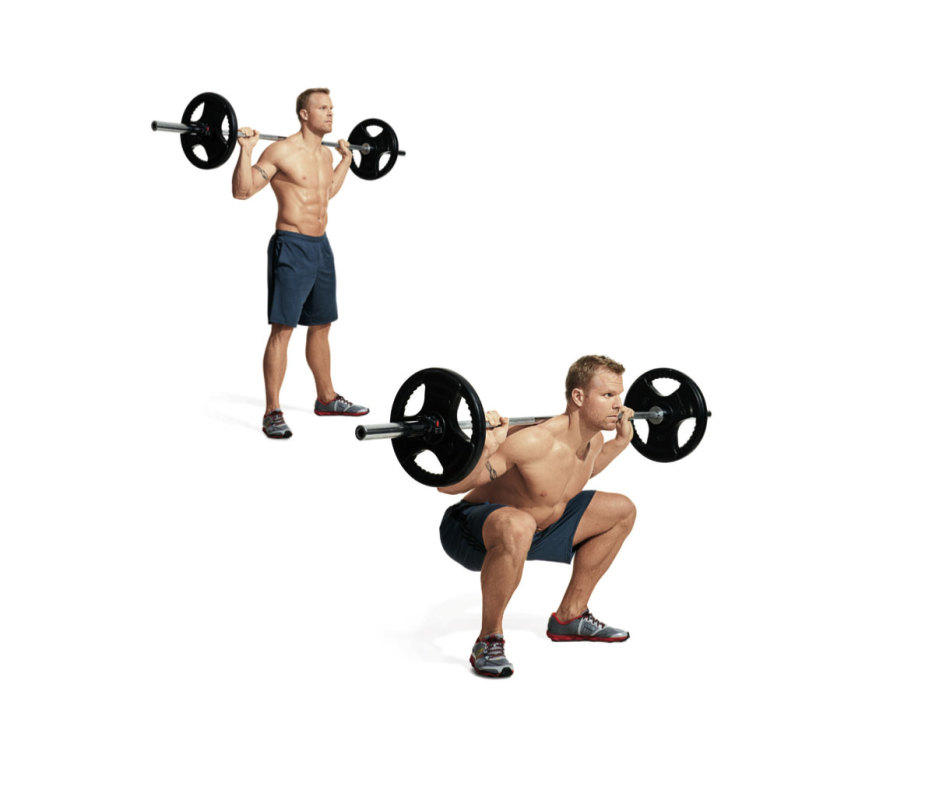
How to do it:
- Set up in a squat rack or cage.
- Grab the bar slightly wider than shoulder-width, basically wide and comfortable.
- Retract your shoulder blades and un-rack the bar.
- Take one step back with each foot and point toes out at 30 degrees.
- Inhale, then bend your hips and knees to lower your body as far as you can without losing the arch in your lower back.
- Push your knees outward as you descend.
- Drive with your hips to come back up while pushing your knees outward.
Pro tip:
Keep your neck neutral at all times to maintain proper form, especially during the pause.
Variation:
This move can also be done with dumbbells. Rest one on each shoulder and do a rep with elbows pointed up and triceps forward.
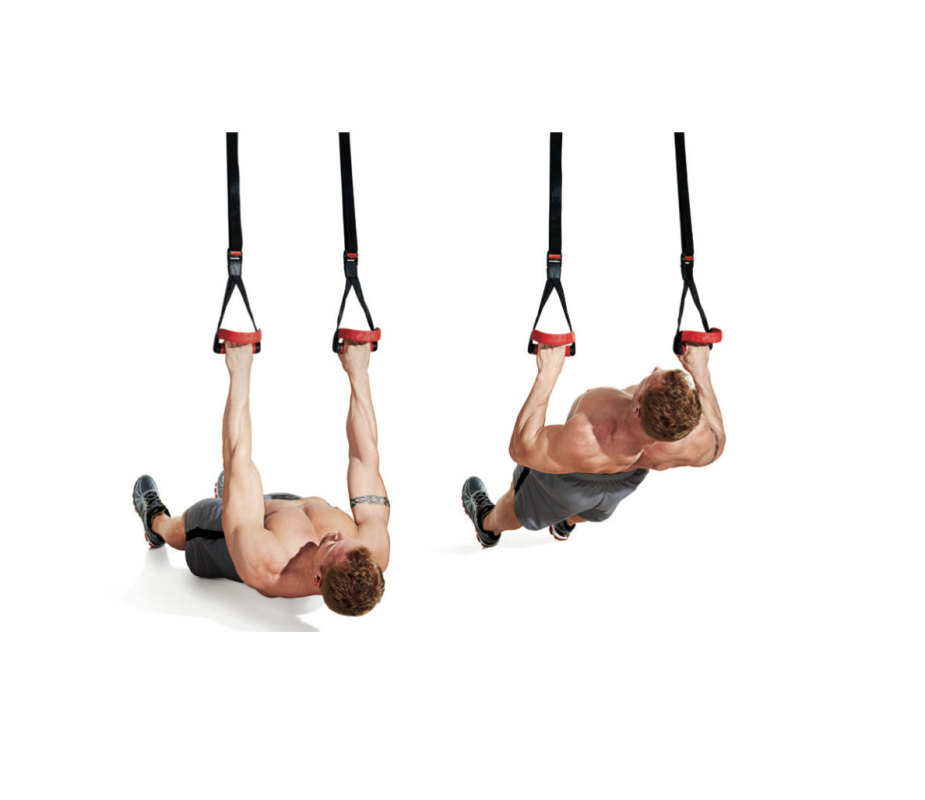
How to do it:
- While holding the handles, lean back with arms extended so that your body is supported by the trainer and only your feet are on the floor.
- Brace your core and hold your body in a straight line. (The lower you set the handles, the harder the exercise; you can elevate your feet on something to make it even harder.)
- With palms facing your feet, row your body up.
Pro tip:
The lower you set the handles, the harder the exercise.
Variation:
You can elevate your feet to add difficulty.
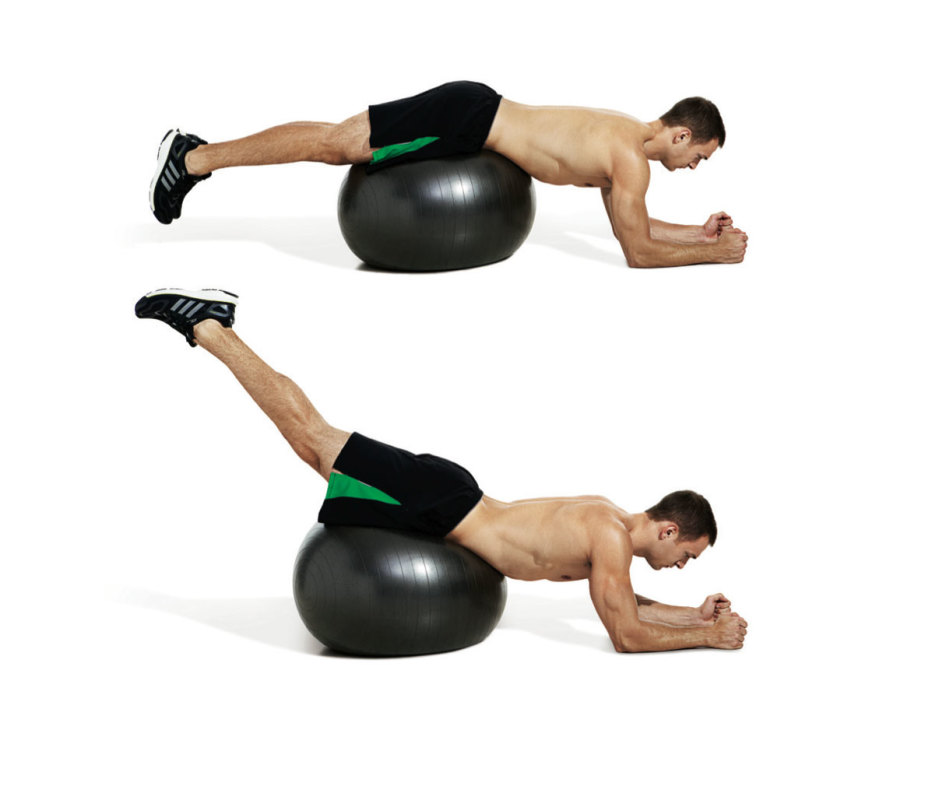
How to do it:
- Lie facedown on the ball and walk your body forward so it supports your hips only, hands on the floor.
- Squeeze your glutes and raise your legs behind you until they’re level with your torso.
Pro tip:
Keep your neck neutral.
Variation:
You can kick your legs behind you at the top of the extension for additional muscle engagement.
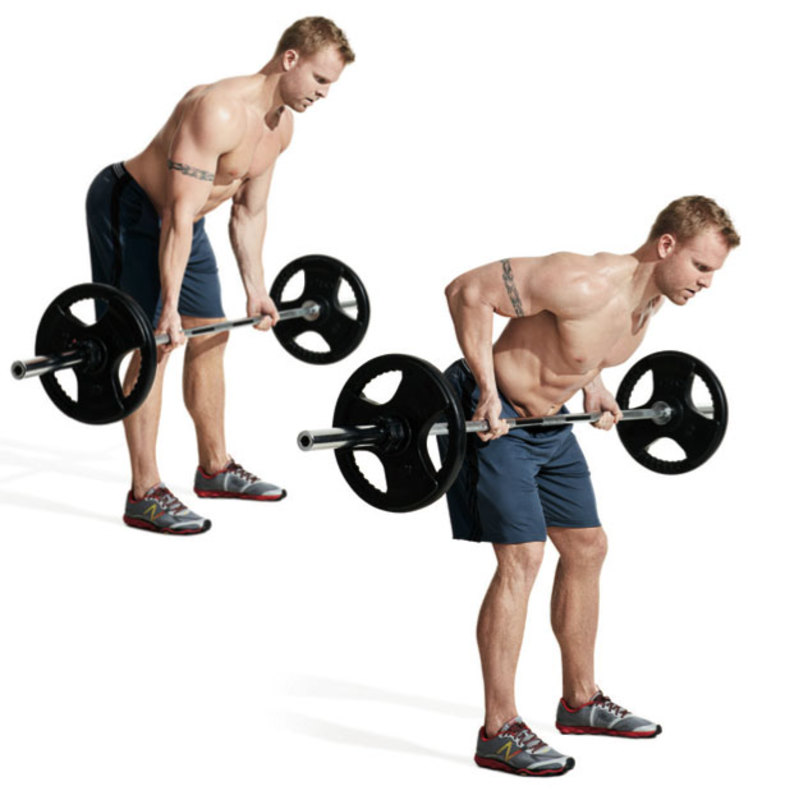
How to do it:
- Hold the bar with an underhand grip at shoulder-width.
- Keeping your lower back in its natural arch, bend your hips back and lower your torso to about 60 degrees.
- Row the weight to your belly button while keeping your lower back from rounding.
Pro tip:
Use momentum to assist the weight upward during the row instead of using your arms for the pull.
Variation:
If you’re concerned about lower back strain, the standing one-arm row or lying incline row will add more support while working the same muscles.
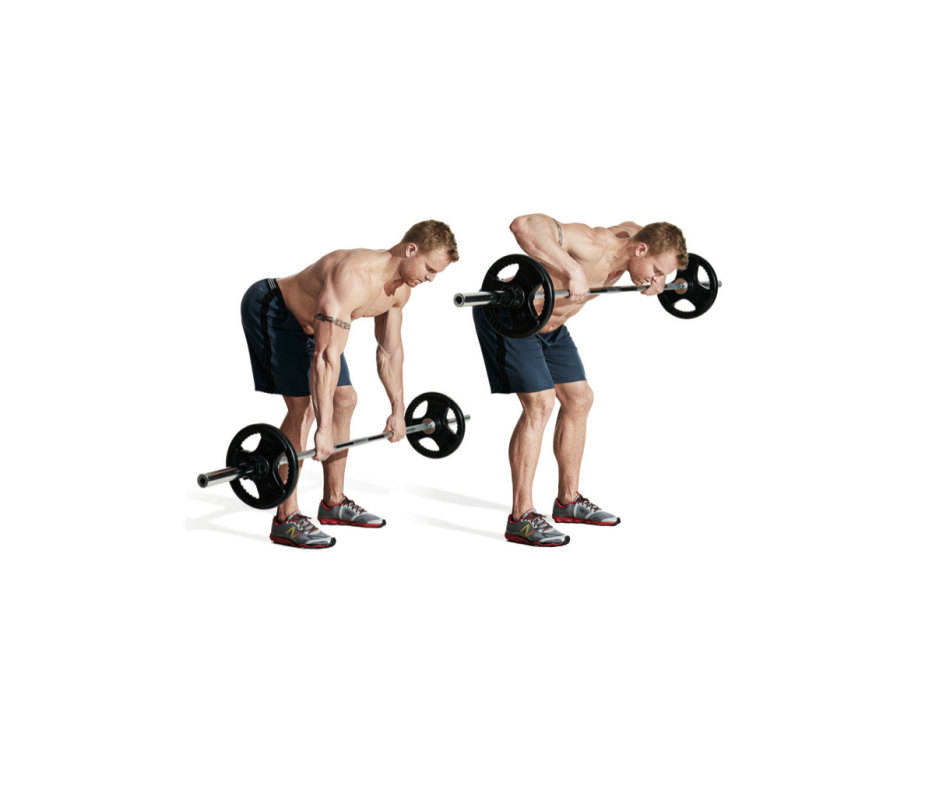
How to do it:
- Grasp the bar overhand and bend forward so your torso is parallel to the floor.
- Squeeze your shoulder blades together and row the weight to your neck.
Pro tip:
This is different than a barbell row to your chest, so be sure to use less weight than you would for a barbell row.
Variation:
Any standing row exercise will work as a variation to this move. Your choice should depend on how far you want to engage your lats and traps.
[ad_2]
Source link

Hi! I’m a dedicated health blogger sharing valuable insights, natural remedies, and the latest scientific breakthroughs to help readers lead healthier lives. With a holistic approach to wellness, I empower individuals with accessible and actionable content, debunking myths and offering practical tips for incorporating healthy habits.